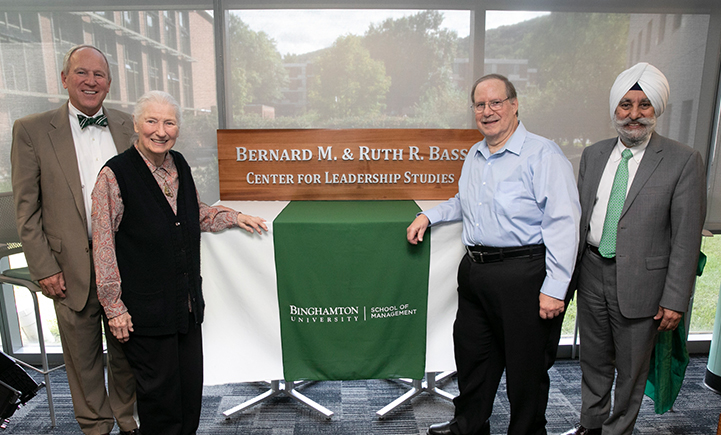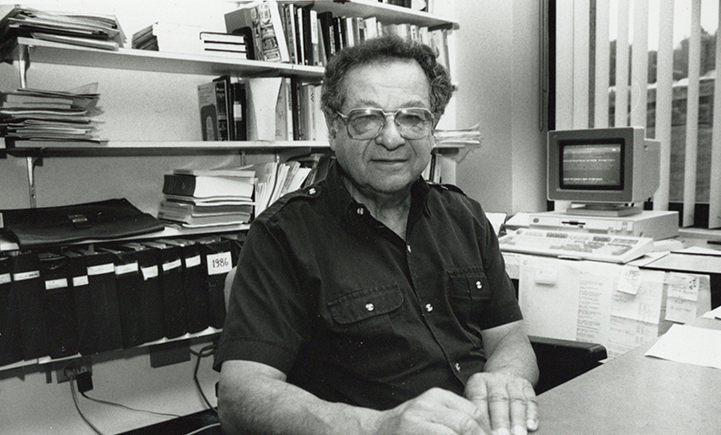Center for Leadership Studies named in honor of Bernard and Ruth Bass
Bernard Bass helped establish the organized research center in 1987

The late Bernard Bass is widely recognized in his field as a preeminent scholar in leadership studies who achieved worldwide renown for Binghamton University and The Center for Leadership Studies (CLS), which he helped establish in 1987.
In September, the CLS organized research center was renamed the Bernard M. and Ruth R. Bass Center for Leadership Studies, honoring the profound effect he had on the center, the campus, his colleagues and students, and the couple’s generosity to support the center.
“At the time of his retirement, he had more publications, more citations and was the No. 1 scholar in leadership in the world,” says Francis Yammarino, SUNY distinguished professor of management and director of the center. “He put not only the School of Management, but Binghamton University, on the map.”
Bass was distinguished professor emeritus in the School of Management (SOM), founding director of the center and author of hundreds of articles and dozens of books on leadership, behavior and management.
“His work in leadership excited faculty and his students,” University President Harvey Stenger says. “Frequently honored by his peers, he was an outstanding representative for the School of Management and the University. All of us at Binghamton appreciate both his past contributions to the University and the continued support from his wife, Ruth.”
Ruth Bass worked closely with her husband on numerous projects throughout his career and was instrumental in helping him complete his last research text, the fourth edition of The Bass Handbook of Leadership: Theory, Research, & Managerial Applications.
“We always tried to find things we could do together. We were symbiotic,” she says. “I’ve always been interested in what goes on at the center, who’s doing research and what they’re working on. They are doing a wonderful job.”
Her generosity supports the annual Bass Speaker Series, hosted by the center and held at Binghamton each fall.
This year’s speaker was John Antonakis, invited to campus from Switzerland, where he is a professor of organizational behavior and director of the PhD program in management at the University of Lausanne. He is also editor-in-chief of The Leadership Quarterly journal, whose founding editor was Bernard Bass.
Bass’ legacy
Bernard Bass was a mentor and role model for several generations of Binghamton faculty and students, according to Dean Upinder Dhillon. The center continues to honor Bass’ vision by remaining at the forefront of innovative leadership research and education.
“The School of Management was fortunate to have Bernie Bass, a world-renowned scholar in transformational leadership,” Dhillon says. “His influence on the field extended over six decades.”
Bass was the primary reason John Joseph Sosik says he pursued his doctorate at Binghamton. Sosik graduated from SOM’s inaugural PhD program in 1995 and is now a professor of management and organization at Pennsylvania State University.
“At that time, the transformational/ transactional leadership research paradigm that Bernie originated was gaining much attention at other universities, corporations and the media,” Sosik says. “His ideas forged the foundation for the body of work I’ve published. To this day, I still use much of what I learned from all the outstanding folks who worked at the CLS and appreciate their fine mentoring and role modeling.”
Sosik adds that he’s developed four Penn State masters-level leadership courses based on what he learned at the center, with the most popular course based on the Full Range Leadership Development training that was offered by the center to Southern Tier corporations. That Penn State course was so popular with MBA students that Sosik developed an entire graduate degree program around it: Penn State’s Master of Leadership Development, in existence for nearly 14 years.
For Jayoung Kim, PhD ’18, the Bass Center for Leadership Studies offers a “collegial and stimulating” environment in which to share ideas and learn from faculty and other students.
Kim gained additional opportunities to expand on what she learned in her SOM management courses when she received essential financial support from the center to attend an educational workshop in Detroit and a Society for Industrial and Organizational Psychology conference in California, where she presented a paper.
“We would have been nowhere near as successful without Bernie’s presence, and his and Ruth’s generosity,” Yammarino says. “It allowed us to do things we wouldn’t have been able to do otherwise.”


